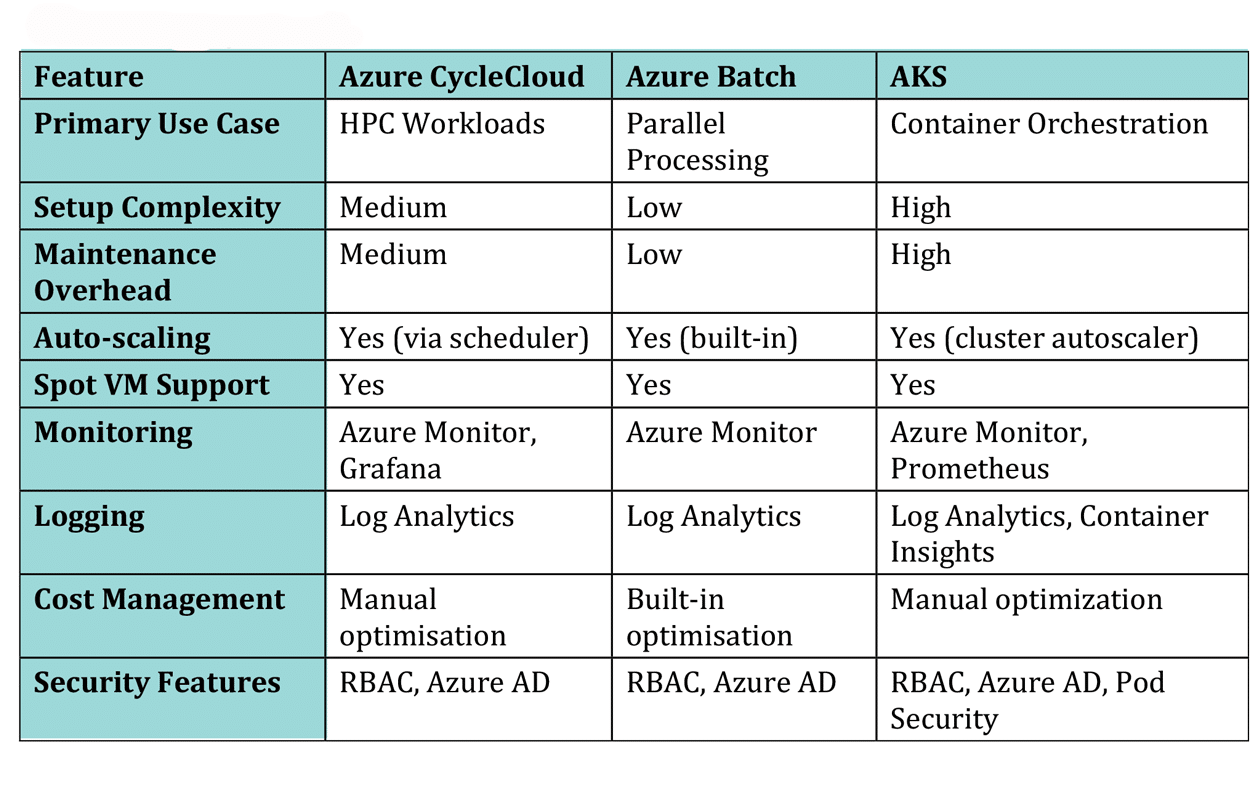Azure Batch, or Azure Kubernetes Service (AKS)
Choosing the right platform for computational workloads is a business decision that impacts scalability, cost, and operational efficiency. Azure offers three powerful options for different use cases: Azure CycleCloud, Azure Batch, and Azure Kubernetes Service (AKS). Each tool has distinct strengths and suitability for specific types of workloads.
This article provides a comparative analysis to help you make an informed decision on which platform best meets your needs.
Understanding the Platforms
Azure CycleCloud
 Azure CycleCloud is a specialised tool for deploying and managing High-Performance Computing (HPC) clusters in Azure. It is particularly suited to tightly coupled, stateful, and specialised workloads that require precise control over infrastructure.
Azure CycleCloud is a specialised tool for deploying and managing High-Performance Computing (HPC) clusters in Azure. It is particularly suited to tightly coupled, stateful, and specialised workloads that require precise control over infrastructure.
For example, it simplifies the provisioning of traditional HPC environments by supporting integration with existing schedulers like SLURM, PBS, and Grid Engine.
This makes CycleCloud ideal for applications that demand low-latency interconnects such as InfiniBand, a critical feature for MPI workloads or other tightly coupled jobs.
A key feature of CycleCloud is its support for cloud-bursting scenarios, allowing organisations to extend their on-premises HPC infrastructure to Azure during peak demand periods.
This hybrid capability ensures optimal resource utilisation while maintaining the value and utilisation of existing on-premise clusters.
CycleCloud is best for scenarios such as computational fluid dynamics, genomics research, and financial modelling, where stateful workflows and shared file systems are needed.
Organisations looking to migrate legacy HPC applications from on-premises to the cloud will find CycleCloud to be an excellent option, as it offers fine-grained control over VM types, scaling, and networking.
Azure Batch
 Azure Batch is a managed service designed for running large-scale high-throughput workloads. It is ideal for processing independent, stateless tasks at scale, where the workload can be divided into discrete jobs that do not need to communicate with each other.
Azure Batch is a managed service designed for running large-scale high-throughput workloads. It is ideal for processing independent, stateless tasks at scale, where the workload can be divided into discrete jobs that do not need to communicate with each other.
This makes Batch a strong choice for embarrassingly parallel workloads, such as image rendering, video transcoding, and Monte Carlo simulations. It is also ideal for running containerised workloads and workflows through workflow management tools such as Nextflow for bioinformatics and AI workloads.
Batch offers sophisticated auto-scaling capabilities that can automatically adjust compute resources based on workload demands. It also supports Azure Spot VMs, enabling significant cost savings for workloads.
One of Batch’s key advantages is its native support for containerised workloads. Tools like Nextflow can easily integrate with Batch to run bioinformatics pipelines, allowing for efficient scaling and cost optimisation.
The platform’s pay-per-use pricing model and integration with Azure Blob Storage and Azure Data Lake make it even more attractive for workflows that require high scalability without the complexity of manual resource management.
Azure Kubernetes Service (AKS)

AKS is a managed Kubernetes platform designed for orchestrating containerised applications. Unlike Azure Batch, which focuses on stateless tasks, AKS can handle both stateless and stateful workloads, making it highly versatile.
For stateful applications, AKS provides advanced capabilities such as persistent volumes, StatefulSets, and integration with robust storage solutions.
AKS integrates exceptionally well with Azure DevOps (ADO) for CI/CD pipelines and Azure Container Registry for secure container image management.
This integration enables automated deployment workflows and simplified container lifecycle management. The platform also supports GitOps practices through tools like Flux and Azure Arc for consistent application deployment and management.
AKS works well with organisations adopting modern DevOps practices and containerised workflows. Its flexibility makes it suitable for distributed machine learning training, hybrid deployments, microservices architectures and serving models via APIs.
While AKS offers extensive customisation and control, it requires Kubernetes expertise to manage and optimise effectively.
Feature Comparison
Setup Complexity and Maintenance

CycleCloud
- Initial setup requires HPC expertise
- Template-based deployments reduce complexity
- Regular maintenance needed for scheduler updates
- Medium learning curve for administrators
Azure Batch
- Minimal setup requirements
- Managed service reduces maintenance overhead
- Built-in job and task management
- Lower learning curve
AKS
- Complex initial setup and configuration
- Regular cluster updates and maintenance required
- Need for Kubernetes expertise
- Steep learning curve for operators
Monitoring and Logging Capabilities
CycleCloud
- Integration with Azure Monitor
- Custom metrics for HPC workloads
- Support for third-party monitoring tools
- Comprehensive scheduler logs
Azure Batch
- Native Azure Monitor integration
- Built-in task and job monitoring
- Detailed resource utilization metrics
- Automated log collection
AKS
- Container insights
- Prometheus integration
- Detailed pod and node metrics
- Distributed tracing support
Use Cases and Recommendations
The choice of platform depends on the nature of your workload and organisational goals. Azure CycleCloud is well-suited to traditional HPC workloads such as weather simulation models, where tightly coupled tasks require low-latency communication.
Azure Batch is best in scenarios like video transcoding, where thousands of files can be processed independently with minimal operational overhead. AKS, with its flexibility, is ideal for distributed machine learning workflows, such as synchronising model weights across nodes during training.
For example, a bioinformatics pipeline built with Nextflow could use Azure Batch for containerised, stateless execution of independent tasks. However, a computational fluid dynamics model requiring shared state and low-latency interconnects would be better provided by Azure CycleCloud.
Meanwhile, a company implementing a microservices architecture or hybrid cloud deployment would benefit from the scalability and orchestration capabilities of AKS.
Final Thoughts
 Choosing the right platform is really important for optimising performance, cost, and scalability.
Choosing the right platform is really important for optimising performance, cost, and scalability.
Azure Batch is an ideal choice for stateless, highly parallel workloads, while AKS offers the flexibility needed for containerised, modern workflows.
For traditional HPC applications, Azure CycleCloud provides the specialised capabilities required for high-performance environments.
If you are unsure which platform best meets your needs, consulting with an expert can save time and resources.
Our team can help you design and optimise cloud solutions tailored to your specific requirements, whether you are working on HPC, batch processing, or container orchestration.

Martin Callaghan
Principal Consultant
Red Oak Consulting


